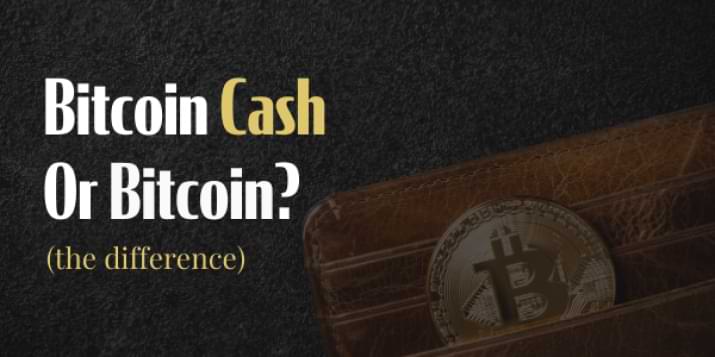
Difference between Bitcoin Cash and Bitcoin (Explained)
In order to get your head around why Bitcoin in general (and Bitcoin Cash) was created, we need to start with the problem we all face from one time or another.
You work hard to earn a good wage that supports your lifestyle. Let’s say you want to get $20k out of your bank account. What happens next??
The bank asks you (for documentation purposes) “What is your reason for taking out this money today?” and if they don’t “approve” of your answer, you don’t get access to your money.
This however, is not a loan, you’re definitely not stealing it.. This is YOUR MONEY!
Now whether you choose to have a playfight with money, donate it to a charity or stuff it in an old mattress, it really is NONE of their business!
Ok, What about Bitcoin?
Getting back to Cryptocurrency and the idea of decentralised trading, Bitcoin in its capacity to make fast, cheap and easy transactions was not quite hitting the mark.
The Blockchain Technology for Bitcoin was small and not scalable as Bitcoin bundled their transactions into block which means it was only able to make on average 4.6 transactions per second. (Visa has the capacity to do 1,700 per second)
To create a visual around this..
Bitcoin, as far as trade goes, is like everyone in the city of New York jumping into their cars at the one time and all having to drive down a one lane road to get to where they are going. This obviously creates congestion and is going to take you a lot longer to get to your destination.
Bitcoin did offer the option to pay a higher transaction fee if you wanted to get closer to the front of the line which lead to two issues.
1. Having to pay fees of up to 30% on your transaction
2. If EVERYONE decided to jump the que, we are left with the same situation
What was wrong with Bitcoin?
The creator of Bitcoin (Satoshi Nakamoto) wanted to cut out the middle man (banks) and allow us to make transactions Peer to Peer in daily transactions. The above issues however made this counterintuitive as up to an hour delay and higher fees is not appealing and is not scalable as a long-term solution. This resulted in people sitting on their Bitcoins the same as we would a Gold Bullion vs use it daily.
How does Bitcoin Cash come into this?
To Bitmain and Roger Ver (referred to as “Big Blockers” in the Bitcoin camp) the solution seemed obvious. If the problem is the size of the Blocks (roads) being 1 megabyte, let’s make the Blocks bigger to 8 megabyte so more transactions (cars) can get through.
However the Small Blockers did not agree and saw benefit to keeping the 1MB and instead of increasing the Blocks (lane size), decided the best way to optimise what is already happening was in creating what is referred to as Segwit and Lightning Network (which is the equivalent to catching the bus).
Unlike regular business, in order for any features to change they are required to have 100% agreement on all updates from Miners, Developers, Wallets, Nodes, Exchangers and of course, you as a User. No agreement was made hence we get to the “Fork” which is Bitcoin Cash.
Bitcoin Cash, backed by Roger Ver (Alleged Bitcoin Billionaire) was satisfied with the adjustments which include Bigger Block Sizes (32MB on 15 May 2018 ), No Segwit (which they believed would compromise to the decentralization of the Bitcoin network), Lightening Network and a different capacity to Mine (keeping this simple).
Where this gets interesting is on the 15th of November 2018, Bitcoin Cash also split into forks too. One backed by Roger Ver and Bitmain (ABC), the other Bitcoin (SV – standing for Satoshi’s Vision) backed by a Craig Wright (a man who alleged to be the alias of Satoshi Nakamoto) and Calvin Ayre, due to Bitcoin (ABC) not staying true to the original Bitcoin Whitepaper.
How is Bitcoin Cash different to Bitcoin?
As Bitcoin Cash is a result of a chain split from Bitcoin, it shares much of Bitcoin’s fundamental workings. In fact, they even share the same history. When Bitcoin Cash started, if you had 1 Bitcoin, you now also had 1 Bitcoin Cash.
However, the coins are not interchangeable. If you send your Bitcoin Cash to the Bitcoin network and somehow own 2 BTC. Your bitcoin cash and bitcoin are now on two different sets of blockchains.
Bitcoin Cash, in its usability, has bigger blocks and is therefore faster and Cheaper.
How do I store my Bitcoin Cash?
If you are new to cryptocurrencies or are not careful with key management, it can be confusing to deal with Bitcoin Cash especially if you own Bitcoin and other Bitcoin-forks.
Bitcoincash.org suggests a few wallets to utilise for your Bitcoin Cash. Please, do your research in choosing the Wallet that suits your requirements.
In 2017 Hardware wallets (Trezor and Ledger - similar looking to USB sticks) became popular. A hardware wallet secures your private key (codes to access) that holds your Bitcoin into an external device outside of your personal computer. This means there is not cause for concern if your computer is infected with malware.
The major differences is that Bitcoin ABC stayed at 32MB where as Bitcoin SV 128MB and expanding. Smart Contract Functionality*
Bitcoin ABC is still more popular and classed as the true Bitcoin Cash.
Basically Bitcoin Cash is a hard fork of the Bitcoin Protocol that created a new coin with a larger block size to enable you to experience greater usability with faster transactions and lower fees while maintaining decentralisation.
In Closing
This system is truly unbiased and it is impressive to see that even with Key players involved with their different ideology, you ultimately get to choose what works for you rather than have to continue with changes that may not work for you.
* A smart contract is a computer protocol intended to digitally facilitate, verify, or enforce the negotiation or performance of a contract. Smart contracts allow the performance of credible transactions without third parties.






Leave a Reply
27 comments
Add comment ×